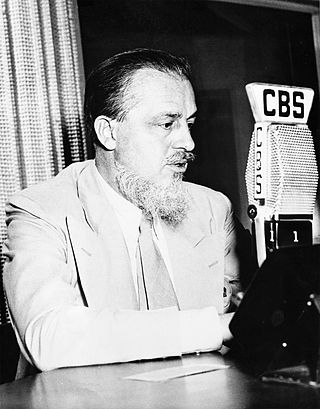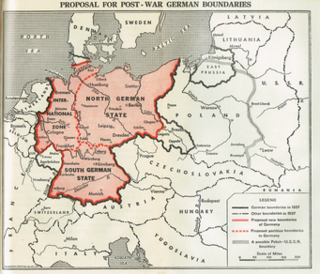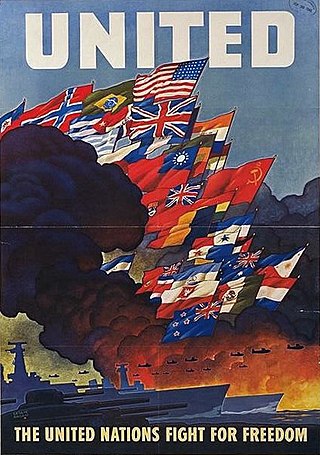Related Research Articles

Rex Todhunter Stout was an American writer noted for his detective fiction. His best-known characters are the detective Nero Wolfe and his assistant Archie Goodwin, who were featured in 33 novels, and 41 novellas and short stories, between 1934 and 1975.
This section of the timeline of United States history concerns events from 1930 to 1949.

Cordell Hull was an American politician from Tennessee and the longest-serving U.S. Secretary of State, holding the position for 11 years (1933–1944) in the administration of President Franklin Delano Roosevelt during most of World War II. Before that appointment, Hull represented Tennessee for two years in the United States Senate and 22 years in the House of Representatives.

The Morgenthau Plan was a proposal to weaken Germany following World War II by eliminating its arms industry and removing or destroying other key industries basic to military strength. This included the removal or destruction of all industrial plants and equipment in the Ruhr. It was first proposed by United States Secretary of the Treasury Henry Morgenthau Jr. in a 1944 memorandum entitled Suggested Post-Surrender Program for Germany.

The Cold War emerged from the breakdown of relations between two of the primary victors of World War II: the United States and the Soviet Union, along with their respective allies in the Western Bloc and Eastern Bloc. This ideological and political rivalry, which solidified between 1945-49, would shape the global order for the next four decades.

Henry Morgenthau Jr. was the United States Secretary of the Treasury during most of the administration of Franklin D. Roosevelt. He played a major role in designing and financing the New Deal. After 1937, while still in charge of the Treasury, he played the central role in financing United States participation in World War II. He also played an increasingly major role in shaping foreign policy, especially with respect to Lend-Lease, support for China, helping Jewish refugees, and proposing measures to deindustrialise Germany.

The Casablanca Conference or Anfa Conference was held in Casablanca, French Morocco, from January 14 to 24, 1943, to plan the Allied European strategy for the next phase of World War II. The main discussions were between US President Franklin Roosevelt and British Prime Minister Winston Churchill. Stalin could not attend. Key decisions included a commitment to demand Axis powers' unconditional surrender; plans for an invasion of Sicily and Italy before the main invasion of France; an intensified strategic bombing campaign against Germany; and approval of a US Navy plan to advance on Japan through the central Pacific and the Philippines. The last item authorized the island-hopping campaign in the Pacific, which shortened the war. Of all the decisions made, the most important was the Allied invasion of Sicily, which Churchill pushed for in part to divert American attention from opening a second front in France in 1943, a move that he feared would result in very high Allied casualties and not be possible until 1944.

The Allies, formally referred to as the United Nations from 1942, were an international military coalition formed during World War II (1939–1945) to oppose the Axis powers. Its principal members by the end of 1941 were the "Big Four" – the United Kingdom, United States, Soviet Union, and China.

The American Defense Society (ADS) was a nationalist American political group founded in 1915. The ADS was formed to advocate for American intervention in World War I against the German Empire. The group later stood in opposition to the Bolsheviks, who came to power in Russia after the October Revolution of 1917, and the proposed American participation in the League of Nations.
James Paul Warburg was a German-born American banker, businessman, and writer. He was well known for being the financial adviser to Franklin D. Roosevelt. His father was banker Paul Warburg, member of the Warburg family and "father" of the Federal Reserve system. After World War II, Warburg helped organize the Society for the Prevention of World War III in support of the Morgenthau Plan.
The Progressive Party was a left-wing political party in the United States that served as a vehicle for the campaign of Henry A. Wallace, a former vice president, to become President of the United States in 1948. The party sought racial desegregation, the establishment of a national health insurance system, an expansion of the welfare system, and the nationalization of the energy industry. The party also sought conciliation with the Soviet Union during the early stages of the Cold War.

The Second Quebec Conference was a high-level military conference held during World War II by the British and American governments. The conference was held in Quebec City, September 12 – September 16, 1944, and was the second conference to be held in Quebec, after "QUADRANT" in August 1943. The chief representatives were Winston Churchill, Franklin D. Roosevelt and the Combined Chiefs of Staff. Canada's Prime Minister William Lyon Mackenzie King was the host but did not attend the key meetings.
The War Refugee Board, established by President Franklin D. Roosevelt in January 1944, was a U.S. executive agency to aid civilian victims of the Axis powers. The Board was, in the words of historian Rebecca Erbelding, "the only time in American history that the US government founded a non-military government agency to save the lives of civilians being murdered by a wartime enemy."

The Writers' War Board was the main domestic propaganda organization in the United States during World War II. Privately organized and run, it coordinated American writers with government and quasi-government agencies that needed written work to help win the war. It was established in 1942 by author Rex Stout at the request of the United States Department of the Treasury.

Germany is Our Problem is a book written in 1945 by Henry Morgenthau Jr., U.S. Secretary of the Treasury during the administration of Franklin D. Roosevelt. In the book he describes and promotes a plan for the occupation of Germany after World War II.

Throughout World War II, both the Axis and Allied sides used propaganda to sway the opinions of Indian civilians and troops, while at the same time Indian nationalists applied propaganda both within and outside India to promote the cause of Indian independence.
The presidency of Franklin D. Roosevelt began on March 4, 1933.
Report to the Secretary on the Acquiescence of This Government in the Murder of the Jews was the initial title of a government memorandum prepared by officials of the United States Department of the Treasury. Dated January 13, 1944, during the Holocaust, its primary author was Josiah E. DuBois Jr., Assistant to the Secretary of the Treasury. Focusing on the period from late 1942 to late 1943, the report argued that certain officials within the US State Department not only had failed to use US government tools to rescue Jewish European refugees but instead had used them to prevent or obstruct rescue attempts, as well as preventing relevant information from being made available to the American public. Described as "political dynamite", the memorandum, shortened and re-titled Personal Report to the President, helped convince President Franklin D. Roosevelt to approve the creation of the War Refugee Board.

The third presidential term of Franklin D. Roosevelt began on January 20, 1941, when he was once again inaugurated as the 32nd president of the United States, and the fourth term of his presidency ended with his death on April 12, 1945. Roosevelt won a third term by defeating Republican nominee Wendell Willkie in the 1940 United States presidential election. He remains the only president to serve for more than two terms. Unlike his first two terms, Roosevelt's third and fourth terms were dominated by foreign policy concerns, as the United States became involved in World War II in December 1941.

Winston Churchill was appointed First Lord of the Admiralty on 3 September 1939, the day that the United Kingdom declared war on Nazi Germany. He succeeded Neville Chamberlain as prime minister on 10 May 1940 and held the post until 26 July 1945. Out of office during the 1930s, Churchill had taken the lead in calling for British re-armament to counter the growing threat of militarism in Nazi Germany. As prime minister, he oversaw British involvement in the Allied war effort against the Axis powers. Regarded as the most important of the Allied leaders during the first half of the Second World War, Historians have long held Churchill in high regard as a victorious wartime leader who played an important role in defending Europe's liberal democracy against the spread of fascism. For his wartime leadership and for his efforts in overseeing the war effort, he has been consistently ranked both by scholars and the public as one of the top three greatest British prime ministers, often as the greatest prime minister in British history.
References
- ↑ Rex Stout Papers "1943 Adopts extreme anti-German attitude after war. Publishes "We Shall Hate or We Shall Fail," an essay which elicits much criticism.". Religion: Moral Poison, Monday, Feb. 22, 1943, Time Magazine "Stout wanted to rouse hatred against those Germans "who accept, either actively or passively, the doctrine of the German master race . . . [or] who, reluctant to join the Nazis, nevertheless failed, through lack of courage or conviction, to prevent the Nazis from . . . plunging the world into this filthy swamp of destruction."
- ↑ "We Shall Hate, or We Shall Fail" (PDF), The New York Times , January 17, 1943, with response by Walter Russell Bowie and reply from Rex Stout; at The Wolfe Pack. Retrieved 2014-06-12.
- ↑ Casey, 2005.
- ↑ Monthly, May 1944-Feb. 1945 Bimonthly, Mar./Apr. 1945-1950 2 no. a year, 1951-1971. Issue 78 winter-spring 1972. Catalogue, National Library of Australia